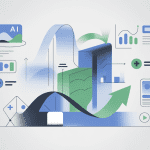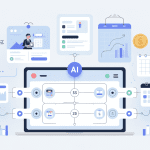
How AI Tools Are Stealing Your Conversions (And What to Watch For)
Your conversion funnel has developed mysterious leaks. Traffic arrives at your landing pages, but fewer visitors take the actions you’ve optimized for.
Email signups decline despite offering the same valuable lead magnets.
Product purchases drop even though your content continues to rank well for commercial keywords.
Something is intercepting your potential customers before they complete desired actions.
That something is artificial intelligence, and it’s quietly reshaping the customer journey in ways that bypass your conversion opportunities.
AI tools provide immediate value to users without requiring them to engage with your business directly.
Your carefully crafted conversion funnels compete with AI systems that satisfy user needs instantly.
ChatGPT and similar AI assistants answer business questions that would previously drive users to your consultation booking pages.
Someone researching marketing strategies can get comprehensive advice from an AI chat interface without ever contacting a marketing consultant.
Your lead generation content competes with AI tools that provide personalized recommendations without requiring contact information.
Google’s AI Overview feature synthesizes product information from multiple sources, giving users comprehensive buying guides without requiring them to visit individual retailer websites.
Your product comparison content gets absorbed into AI-generated summaries that help users make purchase decisions without clicking through to your sales pages.
AI-powered research tools help users solve problems independently rather than seeking professional services.
Business owners who might have hired consultants can now get strategic advice from AI systems trained on vast amounts of business knowledge.
Your expertise becomes accessible through AI interfaces that don’t generate leads for your consulting business.
Voice assistants provide quick answers to questions that would traditionally drive traffic to your FAQ pages and support resources.
Users ask Alexa about your product features or service details and receive information without visiting your website to engage with your sales content or contact forms.
Browser extensions and AI writing assistants help users complete tasks without visiting service provider websites.
Someone writing marketing copy can get AI assistance directly in their browser instead of hiring a copywriter or visiting copywriting service websites.
Your professional services compete with AI tools that provide immediate, affordable alternatives.
Educational AI platforms provide training and skill development that competes with your online courses and coaching programs.
Users can learn new skills through AI tutoring systems without purchasing traditional educational products.
Your course content gets replicated in AI training programs that don’t generate revenue for original creators.
Social media AI features help users create content without hiring social media managers or purchasing content creation tools.
LinkedIn’s AI assistant can write posts, Instagram’s AI can generate captions, and Twitter’s AI can suggest engagement strategies.
Your social media services compete with free AI tools integrated into the platforms themselves.
Email AI assistants help users write professional correspondence without hiring copywriters or purchasing email templates.
Gmail’s AI can compose business emails, sales outreach, and customer service responses.
Your email marketing and copywriting services face competition from AI tools that provide instant, personalized assistance.
Customer service AI chatbots resolve user issues without requiring human interaction or directing users to sales funnels.
Users get their questions answered and problems solved through AI interfaces that don’t create opportunities for upselling or relationship building with human representatives.
Financial AI advisors provide investment guidance and financial planning advice that competes with human financial services.
Users can get personalized financial recommendations from AI systems without engaging with financial advisors or wealth management companies.
Your financial services compete with AI tools that provide immediate, algorithm-driven advice.
Design AI tools help users create graphics, websites, and marketing materials without hiring designers or purchasing design services.
Users can generate logos, create presentations, and design websites through AI platforms that eliminate the need for professional design services.
Legal AI assistants help users understand contracts, write legal documents, and get basic legal advice without consulting attorneys.
Simple legal tasks that once required professional services can now be handled through AI tools that provide immediate, affordable legal assistance.
Healthcare AI systems provide preliminary health information and advice that reduces visits to healthcare providers for basic questions.
Users can get symptom assessments, medication information, and health guidance from AI tools without scheduling appointments or visiting medical websites.
The pattern affects both B2B and B2C businesses across industries.
AI tools are democratizing expertise and making professional knowledge accessible without requiring users to engage with service providers or purchase products.
Your conversion opportunities disappear when AI systems provide immediate value that satisfies user needs completely.
Users develop new behavior patterns that bypass traditional conversion funnels.
They’ve learned that AI tools can provide quick answers, solve immediate problems, and offer personalized guidance without requiring email signups, phone calls, or purchase commitments.
The friction of traditional conversion processes feels unnecessary when AI provides instant gratification.
Your lead magnets compete with AI tools that provide comprehensive information without requiring contact details.
Users can get detailed guides, templates, and resources from AI systems without joining email lists or providing personal information.
The value exchange that drives lead generation gets disrupted by AI tools that provide value freely.
Sales conversations become shorter and more focused as prospects arrive with comprehensive knowledge gained from AI research.
Users come to sales interactions with detailed understanding of options, pricing, and features gathered from AI tools rather than your sales content.
Your educational content that used to build trust and authority gets replaced by AI-generated insights.
The lifetime value of customers decreases as AI tools help them solve ongoing problems independently.
Users who might have become repeat customers or long-term service clients can now handle many tasks through AI assistance.
Your recurring revenue opportunities diminish as AI tools provide ongoing value without requiring continued business relationships.
Customer acquisition costs increase as traditional conversion paths become less effective.
You need more traffic to generate the same number of leads when AI tools satisfy user needs before they reach your conversion points.
The efficiency of your marketing funnels declines as AI intercepts potential customers throughout their journey.
Your competitive advantage erodes as AI tools democratize access to expertise and capabilities that previously required professional services.
The knowledge and skills that differentiated your business become accessible through AI platforms that provide similar value at lower cost and higher convenience.
Recognition of this trend is the first step toward adapting your conversion strategy for an AI-influenced market.
The businesses that thrive will be those that understand how AI changes customer behavior and find ways to provide value that complements rather than competes with AI capabilities.











